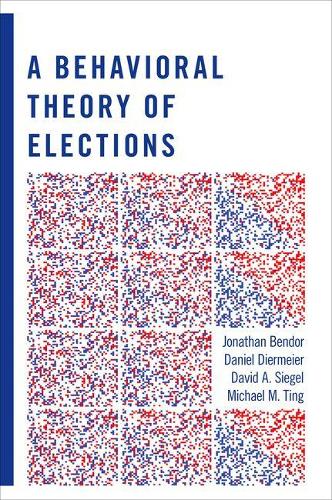
A Behavioral Theory of Elections
(Paperback)
Publishing Details
A Behavioral Theory of Elections
By (Author) Jonathan Bendor
By (author) Daniel Diermeier
By (author) David A. Siegel
By (author) Michael M. Ting
Princeton University Press
Princeton University Press
18th April 2011
United States
Classifications
Tertiary Education
Non Fiction
324.6
Physical Properties
Paperback
264
Width 152mm, Height 235mm
369g
Description
Most theories of elections assume that voters and political actors are fully rational. While these formulations produce many insights, they also generate anomalies - most famously, about turnout. The rise of behavioral economics has posed new challenges to the premise of rationality. This groundbreaking book provides a behavioral theory of elections based on the notion that all actors - politicians as well as voters - are only boundedly rational. The theory posits learning via trial and error: actions that surpass an actor's aspiration level are more likely to be used in the future, while those that fall short are less likely to be tried later. Based on this idea of adaptation, the authors construct formal models of party competition, turnout, and voters' choices of candidates. These models predict substantial turnout levels, voters sorting into parties, and winning parties adopting centrist platforms. In multiparty elections, voters are able to coordinate vote choices on majority-preferred candidates, while all candidates garner significant vote shares. Overall, the behavioral theory and its models produce macroimplications consistent with the data on elections, and they use plausible microassumptions about the cognitive capacities of politicians and voters. A computational model accompanies the book and can be used as a tool for further research.
Reviews
"[T]his book offers plenty food for thought for both theoretical and empirical minded scholars and is a must read for anyone interested in understanding the dynamics of electoral competition."--Jasper Muis, Journal of Artificial Societies and Social Simulation "It ... need[s] to be confronted and digested by every graduate student who hopes to make his or her scholarly name in this field, because it provides a way to unify the higgledy-piggledy world of political behavior. It isn't the final word, but it is an important early step."--Kenneth A. Shepsle, Perspectives on Politics
Author Bio
Jonathan Bendor is the Walter and Elise Haas Professor of Political Economics and Organizations at Stanford University. Daniel Diermeier is the IBM Professor of Regulation and Competitive Practice and professor of managerial economics and decision sciences at Northwestern University. David A. Siegel is assistant professor of political science at Florida State University. Michael M. Ting is associate professor of political science and public affairs at Columbia University.
